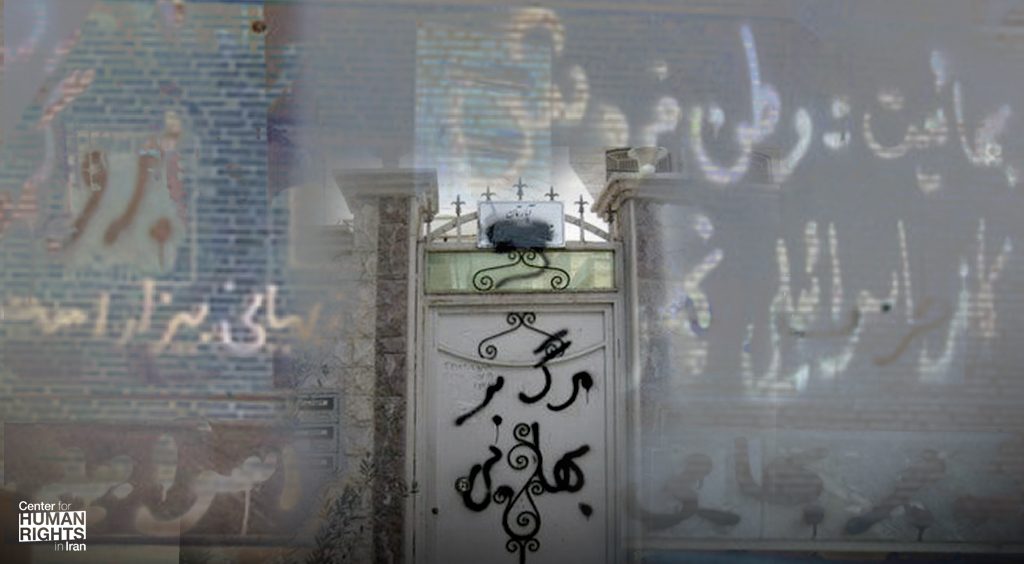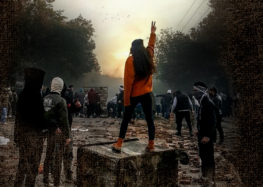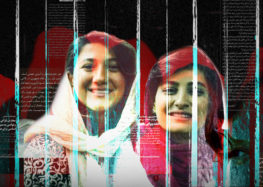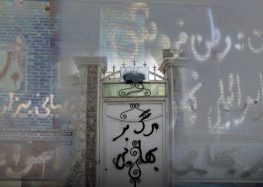Four Baha’is Sentenced to Five Years in Prison for Trying to Access Higher Education
 Court Rulings Reveal Systematic Religious Discrimination
Court Rulings Reveal Systematic Religious Discrimination
The Baha’i faith community is one of the most severely persecuted religious minorities in Iran. Iran’s government is unabashed in its propagating of false narratives about the community and has for decades blocked Baha’is from obtaining prominent positions in Iranian society as well as barred Baha’is from accessing higher education.
Iran’s Constitution does not recognize the Baha’i faith as an official religion (such as Islam, Christianity, Judaism, and Zoroastrianism). Although Article 23 states that “no one may be molested or taken to task simply for holding a certain belief,” followers of the faith are denied many rights—including property ownership and equal burial rights.
Baha’is are also routinely banned from enrolling in university, and can be expelled without a proper explanation once enrolled in a school.
How does the Islamic Republic of Iran identify and ban Baha’i students seeking to enter universities? Why are Baha’i youth prosecuted for seeking higher education? The following report is an analysis of a court case against four Baha’is, details of which have been obtained by the Center for Human Rights in Iran (CHRI).
The defendants, unnamed here to protect their privacy, were sentenced to long prison terms based on trumped-up “national security” charges. Their cases reveal the cruelty of Iran’s security and judicial systems, which manufacture false stories about Baha’i faith members simply to prevent them from improving their living and social standards by accessing higher education.
Baha’i Faith Unjustly Smeared as “National Security” Threat
The Islamic Revolutionary Guard Corps’ (IRGC) intelligence organization, known as the Sarallah Headquarters, is often involved in court cases against Baha’i faith members.
After the state organization cooked up cases against four Baha’is in recent years, they were each sentenced to five years in prison on the charge of “acting against national security through the Baha’i cult organization and posting falsehoods online.”
Although none of the Baha’is had engaged in actual crimes and had been targeted and prosecuted simply for trying to enroll in universities, the judge based his rulings on Articles 498 and 499 of the Islamic Penal Code, which state:
Article 498 – Anyone, with any ideology, who establishes or directs a group, society, or branch, inside or outside the country, with any name or title that constitutes more than two individuals and aims to perturb the security of the country, if not considered as mohareb [armed rebellion], shall be sentenced to two to 10 years’ imprisonment.
The following Article 499 states that “anyone who joins, as a member, any of the groups, societies, or branches in article 498 shall be sentenced to three months to five years’ imprisonment unless it is proven that he was unaware of its aims.”
The court’s main “evidence” was a report by the IRGC’s intelligence organization in which the defendants were accused without substantive evidence of “promoting the Baha’i cult” and “smearing the Islamic Republic with the publication of falsehoods about the conditions of Baha’i prisoners and about the state’s actions against Baha’is attending universities.”
In his ruling, the judge described the four Baha’is as “activists in a secret, illegal, educational organization” and repeatedly mentioned the Baha’i Institute for Higher Education (BIHE), an independent, web-based university established in 1987 that offers education alternatives to Baha’is who have been banned from accessing state or private universities in Iran.
BIHE Accused of Acting Against the State for Providing Online Courses
In sentencing one of the four defendants, the judge noted that the person was a BIHE graduate who was “invited by leaders of this false Baha’i cult through email to teach classes to Baha’is and grade their work.”
As such, the judge ignored two facts. First, that Iran’s judicial system regards the BIHE’s existence as a crime even though it has never broken any Iranian laws. Second, that the prosecution falsely painted the defendants as associated with the “leaders of the false Baha’i cult” to justify harsh punishments.
The court ruling also equated normal online university activities with espionage by simply noting that the defendants “held classes for students… and registered their grades online with a password that was sent via email” and that “One of the missions given by the cult leaders was to attract individuals to work for the online university.”
The ruling also notes that one of the defendants had a channel on the Telegram messaging app where “all its members were Baha’is”, thereby claiming the defendant was involved in organized activities that somehow threatened national security. Yet the judge never provided concrete evidence that the Telegram channel did any such thing.
This ruling indicates that in the eyes of Iran’s judicial system, the simple act of Baha’is teaching and providing educational activities to other Baha’is is equal to “propagating and spreading” their faith, even though the court’s ruling never showed a link between the two acts.
Iran’s Judicial System Supports Religious Discrimination
For two of the defendants, the case against them began when they were barred from enrolling in university simply because they were Baha’i faith members.
In response, they exhausted every legal means of fighting this religious discrimination, from writing letters to the Ministry of Science Research and Technology, and the President’s office, to meeting with members of Parliament—all to no avail. In the end, they were still prohibited from enrolling at an Iranian university.
As a last resort, the two enrolled in the BIHE’s online classes but dropped out a few months later when they were accepted into an Iranian university that did not require them to reveal their faith on their application.
However, when the university’s officials discovered that the two students were Baha’is, they were both expelled.
The court ruling against one of the expelled students states, “The said person is a member of the false Baha’i faith who has attended all their events and enrolled as a student in the Baha’i online university.”
The other student was also punished for enrolling at BIHE. “The said person has admitted to studying in the BIHE…,” says the ruling. The use of the word “admitted” suggests that the defendant committed a crime simply by being a BIHE student.
The court also condemned the defendants for their online posts about the injustice of Baha’is being banned from obtaining university educations, which the court decried as “accusing the Islamic Republic of ethnic discrimination.”
Another defendant was meanwhile accused of “starting a campaign against the alleged prohibition on Baha’i students” and slandering the Islamic Republic by posting information about a girl who automatically received a failed grade on her university entrance exam simply because she was a known Baha’i faith member.
Another of the four defendants was portrayed as a security threat for “being a member of online social networks such as Lion, Viber, Emo, WhatsApp, Telegram, Tango, BeeTalk… in order to promote this false cult.”
Although millions use these apps, the court ruling made it appear as though—again without supporting evidence—that simply using these apps as a Baha’i is equivalent to being engaged in widespread illegal activities.
New State Methods to Control Baha’is
The fourth defendant in this case, in addition to being accused of “activities in secret illegal organizations dedicated to Bahai’s” and enrolling as a student at BIHE, was faulted for establishing a daycare center, which was equated with propagating Baha’i beliefs among children.
“The said person intended to carry out the plans of the false Baha’i cult to train children and youth by creating a home-based daycare and educate the children with the cult’s psychological programs,” the ruling said.
Yet once again, no substantive evidence was shown to support the allegation, or explain what the judge meant exactly by “psychological programs.”
Unsubstantiated, Discriminatory Court Ruling
The court found all four Baha’is guilty of “acting against national security through the Baha’i cult organization and posting falsehoods online” and sentenced them to five years in prison each in accordance with Article 499 of the Islamic Penal Code. The sentences were later upheld on appeal.
However, no connections were established between what the defendants actually did and what they were charged with doing. The only “evidence” was the word of the IRGC’s intelligence organization.
Yet according to the Iranian judiciary, being a student at an online Baha’i university is equivalent to “organizing against Iran’s national security.”
In essence, the ruling conveys that according to the Iranian government, the mere act of being a Baha’i faith member is sufficient grounds to deny Baha’is higher education and to convict them of “national security” charges.
Yet in reality, the only acts these Baha’is could be accused of were trying to enroll at an Iranian university, trying to find alternative online education options after being banned from Iranian universities, and criticizing religious discrimination.
Two of the defendants were also convicted in part because they participated in a vigil at the Iranian Bar Association’s office, a peaceful and legal activity that was nevertheless deemed an act against national security by followers of a banned religion.
The start of the new academic year in Iran has shown no letup in the Islamic Republic’s determination to block Baha’i students from enrolling at Iranian universities. In fact, the administrative process has been fine-tuned.
“For many years, Baha’is who had taken [and passed] Iran’s national university entrance exams were later told that their applications were ‘incomplete’ or ‘defective’ despite this not being the case,” said a statement from the Baha’i International Community on October 4, 2021.
“Now growing numbers of young Baha’is have been told that they were ‘rejected’ due to not meeting the ‘general qualification’ for university study. Belonging only to a religion recognized by Iran’s Constitution, i.e. Islam, Christianity, Judaism or Zoroastrianism, is a general qualification stipulated on the education authority’s own website.”
The statement adds: “Baha’is in Iran—and around the world—view the transition into power of the new government as an opportunity for the Iranian authorities to commit themselves to guaranteeing the basic human rights of all of its citizens and to end its long-running persecution of the Baha’is. And surely the Iranian government should focus on the country’s many pressing crises rather than continuing to spend its time and resources suppressing an innocent and defenseless community who are the well-wishers and lovers of their homeland.”
Read this article in Persian






